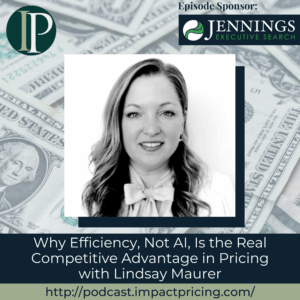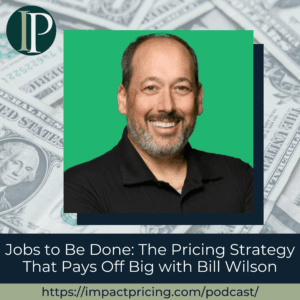Joe Woodard’s vision is to “transform small businesses through small business advisors.” And in the service of that vision, he and his team educate, coach, provide resources and build communities for small business advisors, with the overarching goal of empowering them to play a powerful, high-impact advisory role with their clients.
In this episode, Joe shares how you can create product differentiation that provides maximum pricing leverage where people lean into the product’s value more than the price.
Podcast: Play in new window | Download
Why you have to check out today’s podcast:
- Find out the key factors that create pricing leverage
- Find out how to make your services or products more valuable
- Learn how to truly get differentiated from among the rest of your competitors
“Well, I’m going to restate something I’ve already said: Be unlike everybody else. But I’m going to state something I haven’t stated before: Make sure you over-manage your brand because you could be unlike everybody else, and nobody knows it.”
– Joe Woodard
Topics Covered:
01:50 – Talking about classical Greek
02:40 – Coaching business with a pricing attitude
06:40 – Getting rid of clients you don’t want to work with and keeping the ones you want
11:18 – How ‘relationship work’ gets the highest capacity yield off the least valuable clients
12:34 – Leveraging your unique knowledge or skill to add value to your client
18:39 – Product differentiation: flat fee versus hourly pricing
25:59 – Is it impossible to get accountants to coach their clients on price and what are they capable and very good at doing
28:46 – Joe’s pricing advice that can create a significant impact on one’s business
Key Takeaways:
“Just because you’re valuable and essential, though, doesn’t mean that that creates pricing leverage. You must also be differentiated and unique, and ultimately you must be wealth-generating.” – Joe Woodard
“To have an empowerment impact on small business, they must be healthy themselves, and health naturally involves healthy pricing.” – Joe Woodard
“Their problem is they’re underpricing because they’re penalizing their own efficiency. So, you’re benefiting from the fact that they’re penalizing themselves. And as long as that exists in the space, and it’s going to exist in the space pervasively that people are flattening it out to increase efficiencies and gross profit margin, you are not going to be able to compete on price. So, the only way to get out of that trap for you, as the client and them as the professional is to not offer flat fee services, but instead to offer subscription services.” – Joe Woodard
People / Resources Mentioned:
- Ron Baker: https://impactpricing1.wpengine.com/podcast/ep44-ronald-j-baker-trash-the-timesheet-exploring-opportunities-in-subscription-businesses/
- Xero: https://www.xero.com/
- Sage: https://www.sage.com/en-us/
- Intuit: https://www.intuit.com/
- H&R Block: https://www.hrblock.com/
- Liberty Tax: https://www.libertytax.com/
- Tax Slayer: https://www.taxslayer.com/
- Turbo Tax: https://turbotax.intuit.com/
Connect with Joe Woodard:
- Website: https://www.woodard.com/
- LinkedIn: https://www.linkedin.com/in/quickbooksadvisor/
Connect with Mark Stiving:
- LinkedIn: https://www.linkedin.com/in/stiving/
- Email: [email protected]
Full Interview Transcript
(Note: This transcript was created with an AI transcription service. Please forgive any transcription or grammatical errors. We probably sounded better in real life.)
Joe Woodard
Well, I’m going to restate something I’ve already said: Be unlike everybody else. But I’m going to state something I haven’t stated before: Make sure you over-manage your brand because you could be unlike everybody else, and nobody knows it.
[Intro]
Mark Stiving
Today’s podcast is sponsored by Jennings Executive Search. I had a great conversation with John Jennings about the skills needed in different pricing roles. He and I think a lot alike. If you’re looking for a new pricing role, or if you’re trying to hire just the right pricing person, I strongly suggest you reach out to Jennings Executive Search; they specialize in placing pricing people. Say that three times fast.
Mark Stiving
Welcome to Impact Pricing, the podcast where we discuss pricing, value, and the numerical relationship between them. I’m Mark Stiving, and my mission is to help your company win more business at higher prices. Today, our guest is Joe Woodard, and here are three things you want to know about Joe before we start. He’s trained over 125,000 accounting and business professionals on practice development, strategic consulting, and a lot more. He hosts Scaling New Heights, the world’s leading training conference for small business advisors. And he’s been recognized many times as one of the top 100 influential people within the accounting profession. And that’s almost certainly because he has a degree in classical Greek. Welcome, Joe.
Joe Woodard
It’s great to be here, Mark.
Mark Stiving
Okay, first off, what is classical Greek? Is that mythology? Or is that something else?
Joe Woodard
The actual language? Yes, I have a degree in how to read, how to translate the language of Greek, not the modern Greek, the dead language that is classical Greek. Aristotle, Socrates, Euripides, Plato. Yes. It’s very useful in the modern world.
Mark Stiving
I was just wondering, were you planning on getting a job after you graduate?
Joe Woodard
Yeah. See, I wanted to become a professor, teach classical Greek so that other people could not have a job. Yeah.
Mark Stiving
Okay. Perfect.
Joe Woodard
That was my old career path. Yeah.
Mark Stiving
Nice. Hey, normally, I start the interview out with how did you get into pricing? But I wouldn’t say that you’re in pricing per se. So, let me ask how did you learn the pricing lessons that I heard you speak on the Soul of Enterprise podcast?
Joe Woodard
Yeah, so I came at it from a need point. I coach practices. I coach accounting firms, bookkeeping practices, and other small business advisors in how to be more successful in their practice and, more importantly, how to have a transformative impact on their clients. So, we have a school of advisory. We have educational programs like Scaling New Heights; we have resources, we have professional communities, all designed to empower small business advisors to transform small businesses. But what we found is that to have an empowerment impact on small businesses, they must be healthy themselves, and health naturally involves healthy pricing. So, and what we’re finding with accountants, bookkeepers, CPAs, tax report preparers, especially, for finding pricing to be one of their, if not, predominantly their key challenge in running their practices because of a hyper commoditization impact that’s taking place in our space. Scale players like H&R Block, Liberty Tax, TurboTax, Tax Slayer, they’ve been disrupting professional tax for years, driving price down through commoditization of other forms of price anchors. But what we’re finding is now the bookkeeping community is dealing with the same thing. We do not have a supply and demand problem. Demand is there, but I have these supply of 800,000 global members of the QuickBooks ProAdvisor program alone; over 100,000 of those are certified on that product alone. Then you’ve got Xero, you’ve got Sage, you’ve got all these other platforms. And that’s just the people that take a platform approach. Tax preparers are getting into bookkeeping, the larger firms are getting into smaller-sized business services with bookkeeping, and you have scaled players now entering into the space H&R block has entered bookkeeping. But in addition to that, you’ve got Intuit that has now entered the bookkeeping space. Effectively yes, competing with its own QuickBooks ProAdvisors but I will give them this that they’re doing in a partnering way where they’re trying to raise both ships with a single tide H&R Block just wants to displace. And the most important fact here is Bezo’s centering the space with a heavily Bezo-funded invested pilot company that wants to build out global bookkeeping. In the way that Amazon disrupted retail globally, that’s a multi-billion dollar potential investment in a bookkeeping company. And they’re just one of many I could go on and name about 10, 15 other scaled enterprise-level many times global. Many times, multi-billion dollar bookkeeping companies that now are the Goliath to these little bookkeeping companies, David’s, and it is my job to make sure that the little bookkeeping companies, a little being all the way up to about 50 professionals, can not just survive, but thrive in this world of hyper-competition. Hyper commoditization and pricing, if I want to extend that metaphor helped, you know, is the stones inside David’s slingshot. This is how they fell Goliath. And that got me into the place where I am not predominantly focused on price. But it’s gotten to the point now, Mark, where I cannot coach a business unless I first address price.
Mark Stiving
That’s actually a fabulous answer. And when I think of coaching businesses, I usually go in with a pricing attitude. But it almost always expands to the entire business, right? It’s what products are you going to build? And how are you going to talk about them? And how are you going to market them? So, it isn’t just what’s the number I’m going to put on the product? Or how am I going to set the price? I just use a pricing lens for everything I do. And a lot of people see they have a pricing problem, so they bring me in, where you’re saying a lot of people see they have other problems. And by the way, I’m going to have to address price while I’m in there.
Joe Woodard
Well, exactly right. And I love how you’re saying that because price book impacts everything, is impacted by everything, right? And that’s just the nature of things in a capitalistic society. But you know, the other side of the coin of price is value, which we all agree with so, the problem here is sometimes price, in which case, we take a corrective approach. And I’ll get to what that approach looks like in a minute. On the other side of the equation, it is non-corrective; they don’t have a distinctive value. So, then it becomes a product problem. You solve the product problem first, and then you set the price. Now I almost always find with bookkeepers and tax preparers; it’s a combination of both. So, I almost always start with a correction. And then I move into let’s get the value up, let’s create an entirely new differentiated slate of offerings. Let’s get you out of the hyper commoditization pool. And let’s start now convert upgrading. So, we correct first, then upgrade the client relationships to the new product line to different layers or stair steps of increased revenue from existing clientele. Now, on the corrective side, the approach is to expect a certain amount of client walk out. As a matter of fact, I’m even going to say you engineer a certain amount of client walk-out. Because while tax preparers and bookkeepers have a big pricing problem, they do not have a demand problem. There are a lot of clients that want to engage them. It’s capacity they struggle with, its gross profit margin they struggle with. So, if they will treat a price correction, like a pressure valve on their capacity problem, even sole practitioners can monetize that additional capacity, employers can immediately streamline staff if they need to do so. I’ve found they almost never do. I found that typically what happens, about 20% of the clients walk on a price correction, 80% stay. Of those 80%, only about 20% of them even grumble about it. And the 20% that typically walk away are the ones that were maybe a little higher dollar, but they were typically problematic high-friction client relationships anyway. Or they created a psychological or cultural drain on the company. And it was a net benefit to have them walk anyway. And remember if capacity is the problem, even if you wanted to keep those clients and they walk, the other 80% are paying more, and you’ve got 20% of capacity back. Now, the secret is that you don’t tell 100% of your clients, but the price correction is in one memo. Because yeah, right. And that’s the mistake people make because then what if 50% leave? So, what you do is start with the clients that are ‘take it or leave it,’ or maybe even prefer to have walked and maybe you even engineer they’re walking away by correcting in a higher, more aggressive correction. And then, as you work your way through to the clients who are ideal already highly profitable, you still correct aggressively but not necessarily as aggressively because you want to preserve those client relationships; they’re the most likely candidates to upgrade on phase two. So, keep them around, then the next step is to use that additional capacity and sometimes that additional gross profit margin reinvested in developing new skill sets, which creates a new product. And the new product creates an upgrade opportunity, where now you can go from cost-plus pricing into value pricing.
Mark Stiving
Okay, so before we go to the cost-plus versus value pricing, I got to say that I teach a lot of subscription companies how to do pricing. And I love the answer you just gave because what I usually tell my subscription companies is to go out and find the people who use the product the most and raise their prices first because they’re least likely to churn out. And by the time you get to the people who are barely using your product, you’re probably not going to raise their prices because you didn’t want to lose them as a client. So, in other words, we’re selectively choosing which clients we raise prices on when and we’re watching what happens to the churn rate; you’re essentially saying the same thing. But what I love that you added to the story was, I’ve chosen clients I’d actually like to get rid of, so I’m going with them first.
Joe Woodard
The difference is, I consult with software companies; if I consult with a software company on price, I say the same thing. I’m right there with you, Mark; start with your most engaged customers. If I’m dealing with a professional service company, I first start with the most problematic customers. And the catch is they’re almost always still the most engaged. They’re the squeaky wheels. They’re the people calling you about all the time that people burden up out-of-scope work. But even if that’s not the case, the difference is relationship work versus more consumer-level or E-commerce level work. And the relationship work means that I can get the highest capacity yield back off the clients that are least valuable to my business.
Mark Stiving
Yeah, that makes all the sense in the world. Okay, so the next thing you said, and by the way, I don’t know if you know this, I have a book out. It’s called Win Keep Grow: How to Price and Package Your Subscription Business. And what I love about what you just answered as you go from step one, we’re going to adjust your pricing. Step two, we’re going to adjust your packaging, right? We’re going to figure out the right offers and the right products to put in the right packages? So how do you think about that when you’re coaching your clients?
Joe Woodard
Yeah, in packaging, it’s differentiation. I mean, if they’ve listened to you long enough, I think all your listeners understand the concept that the more differentiated I am in the space, the higher my value, but only when that differentiation increases my customers’ wealth. I’m differentiated in… I’ve never actually run the math. So, I’m just going to make a safe guess that I’m in the point 00000000001 percentile of people that can translate Plato from the original Greek. But what is its relative value-added to anybody I engage? Zero, because everything that’s ever been written in a dead language has been written and translated 1000 times over by people who are smarter at it than I am. So, if there’s no relative value-added, the differentiation means nothing. But if you have a combination of differentiation or unique qualities or skill sets in my world, that means unique knowledge; then you can leverage your unique knowledge to increase value for the client. That’s the productization model. So, to really simplify it down, if I had a client, who was a 14-year old babysitter, and the 14-year old babysitter came to me and said, help me to create a product that will help me to create maximized pricing leverage, then I would say, you must do what no other babysitter does in your entire city or county area, you must have an educational program, you must walk your babysitter customers through an educational program of reading, writing, learning skill sets, that’s age-appropriate for where they are, you must be able to adapt that to multiple siblings, and then sell that to clients that you’re not just keeping their child alive while they’re at dinner. You’re educating their child while the parents are at dinner. But then the next level of unique and differentiated knowledge is to learn CPR. Because now in the responsive thing of keeping your child alive, you can keep them alive at a higher degree of safety than other people. If you were to go into the market, say, I know CPR, and I know I’m certified on both of those and name your price and the ‘name your price’ would be the bookkeeper names the price. The bookkeeper asks the parents what that’s worth to them. And then it stops being evaluated like every other babysitter. I was out to dinner three hours; you get paid more than if I was out to dinner two hours; that becomes irrelevant now. Because value negates time duration, it negates the hourly rate. Now it comes down to I’m going to accomplish these amazing objectives with your child if you’re going for an hour or three hours. And therefore, I’m going to charge 50 bucks a babysitting engagement if you’re gone for an hour; if you’re gone for three, it becomes irrelevant. Now, if we translate that into the bookkeeping, and we translate that into the tax world, what kind of knowledge can a bookkeeper or tax preparer or CPA have that most of their peers don’t have? And surprisingly, it’s fairly pedestrian knowledge, cash flow projections, budget curation, spending management, accounts receivable analytics with bad debt expense mitigation. Mark, I don’t know how much you know about the bookkeeping world, but less than 5% of professional bookkeepers provide those services on a consistent, systematic basis with their clients. It’s crazy, but it’s a crazy opportunity system you were doing. And even though CPAs know how to do those things, they went to school to learn how to do those things; they still do them with a vast minority of their clientele. So, very few tax preparers offer tax planning services. You’re in the bottom 20 percentile if you do it consistently for more than 30% of your clients. And you have a built into a product structure; you’re under 10% of your peers. So, you could just lean into the higher-end levels of your core value prop as a tax preparer or as a bookkeeper. And you will get most of the way to differentiation and relative value-added before you ever hit advisory. Bookkeepers and tax preparers are told all the time, we’ll just become a fractional CFO, and you’ll solve the problem. But that’s like telling a nurse, well, just become a brain surgeon, and you’ll solve the problem. The nurse is going to go, well, thanks for the advice. That’s really useful. But to tell a nurse, well, just become a nurse practitioner, and it’ll solve your problem. Well, didn’t that nurse all of a sudden, things well, that’s achievable. And that’s what this equates to. A bookkeeper doing a cash flow projection or accounts receivable analytics it’s like a nurse becoming a nurse practitioner.
Mark Stiving
It’s not the end of the world. And it’s consistent with what they do today, which I find interesting. And I want to go… There are so many directions I want to take your conversation, Joe.
Joe Woodard
Welcome to come back anytime.
Mark Stiving
But I want to start with value pricing for a second. And I’m a huge proponent of value pricing, as you know. And in the world of accounting, the problem that’s usually we’re trying to overcome is how do I get away from hourly pricing and get people to move to pay for value. But now I want to talk about my mind for a second. Because I hired a bookkeeper when I first started my business, and she wanted to charge me a flat rate. And that made me nervous. And so, I ended up hiring her, and I paid her a flat rate. And then two years later, she raised my price; I guess I was one of those customers. But two years later, she raised my prices. And I went and found an hourly rate person, and I paid about half the price that I used to pay my flat rate person. Now I feel horrible that I paid a flat rate person for two years. So, what just happened? And if you were to describe that situation, what do you think just happened?
Joe Woodard
They priced wrong. And I know that’s not what you expected me to say. Because everybody thinks that flat pricing is the holy grail of bookkeeping and tax, but it’s actually not; it’s a trap. It’s jumping from a frying pan, at least to another frying pan, if not back into the fire. So, for the very reason that you just said, because the flat rate is cost-plus pricing. What’s happening is, bookkeepers are becoming faster and faster. Technology is driving efficiencies to greater and greater levels. So, it is in the bookkeeper’s benefit to flatten the rate and increase efficiencies under the rate. Their gross profit margin increases underneath your price. But the downside of it is the savvy buyer, and you’re a savvy buyer, is just going to jump ship to the person who’s self-penalizing. The person that does your books now is self-penalizing. The faster they get, the more efficient they get, the less they’re paid, and you being a savvy business owner or you’re just shopping based on price, that’s not your problem. Their problem is they’re underpricing because they’re penalizing their efficiency. So, you’re benefiting from the fact that they’re penalizing themselves. And as long as that exists in the space, and it’s going to exist in the space pervasively, people are flattening it out to increase efficiencies and gross profit margin, like your former bookkeeper, are not going to compete on price. So, the only way to get out of that trap for you, as the client and they as the professional, is not to offer flat fee services, but instead to offer subscription services. And Ron Baker is a huge proponent of this if you listen to his podcast or read some of his latest works, but a bookkeeper’s flat rate would be to say, what the client would pay me hourly, I will flatten, and then I’ll increase efficiencies underneath it over time. But a subscription price is a complete change of the paradigm. It says, based on what the client needs in their business, what are the outcomes they’re trying to generate, they can price themselves from a slate of offerings, which is what your software clients do all the time, Mark, they put out three tiers, they put out multiple levers that people can pull within the three tiers that change price. So, it’s always a starting app thing or a call for pricing thing. And then they pull these little levers underneath. And by the time they build these custom subscription packages, the prices even within tiers go up or down and they can go up or down month over month. Bookkeepers and tax preparers need to do the same thing. So, I’ve to tell bookkeepers, when you’re looking at a slate of offerings, let the client decide if they’re going to have you process their payroll, have the client decide how often they’re going to pay their clients based because it might actually drive them might be paying their employees as the clients their employees too frequently. And it might be that your subscription model shows them that that’s cost-prohibitive. Don’t pay weekly; pay him twice a month. And then that can help them to mold themselves to do a better back-office efficiency. Maybe they’re running; they’re doing AT runs once a week; they could be running those twice a month. And then they can actually adjust the lift of their back office to your pricing subscription model. But either way, they’re picking and choosing like buying a cable package in today’s world where you actually get choices, like buying a cable package, and then you’re pricing the customer, you’re not pricing the effort. But more importantly than that, I’m going to ask you a follow-up question. If your bookkeeper had been providing services that you could not get on the open market, more commonly, services that you needed. Let’s assume you needed cash flow projection, let’s assume you needed accounts receivable analytics and bad debt expense mitigation, that you wanted a budget that was curated, that you had multiple traveling employees, you needed to hold them down to spending policies, and how much money all that would save you, right, over and above a bookkeeper just doing record keeping. My guess is you would have stayed with the bookkeeper providing the additional value. Correct?
Mark Stiving
Yes, actually, I was going to toss in at the end because I didn’t see a difference between the two. And if there’s no differentiation, then there’s no reason for me to pay more or, you know, they make my decision easier. And it’s price-based, not product-based, or not capabilities-based.
Joe Woodard
If you offer the same product, you just chop it up into two different price modalities; people are always going for what’s the net lower price, which is what you did. So that bookkeeper, if they were my client, I would say they offer a slate of subscription services and lean into differentiated knowledge will solve your problem.
Mark Stiving
So, what I find fascinating is that, as a business person, I care about pricing. And the last thing I want to care about is accounting and bookkeeping. So, somebody could just say, look, let me take all this off your plate, tell you what you need to know. You know, don’t touch this anymore. I got it. Man, I pay him a lot of money.
Joe Woodard
Because here’s the thing, this is what that’s called, that’s called a utility. So even though it’s a need, it’s still a utility need because it’s an overhead purchase that’s hyper commoditized. So yes, I need the electricity that is powering everything from my computer to my lights to my microphone right now. But I’m going to pay as little as I possibly can so that I don’t have to worry about it. And this is the trap that bookkeepers fall into. So, Mark, you’re absolutely right. Bookkeeping is as important as electricity and the heat that’s heating my home right now. So, I’m comfortable and the gas in my car, all those things are essential to life. And bookkeepers are essential to business life, but it doesn’t mean they’re not a utility. And I’m not insulting bookkeepers; they’re actually the backbone of all small businesses. You pull them off the planet today; if aliens come and they just steal our bookkeepers, the entire global economy will collapse. Just because you’re valuable and essential, though, doesn’t mean that that creates pricing leverage. You must also be differentiated and unique, and ultimately, Mark, you must be wealth-generating. If my power company generated wealth for me, it changes the paradigm from utility to something completely different, like Apple can have subscription packages because they generate wealth for me. There’s a show on Apple right now called Swagger that our families thoroughly enjoy and they’re giving; they’re selling me memories. They’re selling exciting moments for my family. That’s not utility. That’s value. So that’s what the bookkeeper should step into.
Mark Stiving
Yep. Okay. So, I want to switch to accounting for a second. And you were talking about you’re leading into this concept of advisors. And the very selfish question I’m going to ask you now. I’ve been teaching and trying to teach some accountants how to coach their clients on pricing. And I find this almost impossible. It’s almost like they don’t care. And so, I want to hear your thoughts on that whole advisory piece.
Joe Woodard
Yeah, so first, getting an accountant or bookkeeper to coach their clients on price is not impossible. It’s just an extremely high lift because until I have coached a practice for a good two to three years, they don’t have the price figured out for themselves. It’s not exactly an enigma, but it is a maze within a maze because of the correction and the privatization thesis. So, I think it’s just how long it takes to coach an accountant or bookkeeper to the point where they’re confident coaching their client on price. So, we don’t even have a price coaching course in our school of advisory for that reason. First, it will happen organically when it happens. And until that point, we can’t coach to it. But what we can say is that bookkeepers and tax preparers and CPAs make really good financial advisors, right, when properly trained, that’s right in their wheelhouse. But they also make very capable operational advisors, technological advisors, information, content curation advisors, we call it knowledge advisory, but what it is, it’s about the capitalization of your intellectual properties. They make really good succession advisors in helping a client increase EBITDA because EBITDA is a financial measurement. And it’s coupled with the operational side. And they make very capable management advisors. So, our school of advisory focuses on those six disciplines. And then as the members of our school advisory master price themselves, the price gets folded. Remember how you started the whole thing? Price is the beginning and end of all conversations; now, just work, now just seek right into the other six disciplines.
Mark Stiving
And that makes sense. And I often think about how CFOs inside a company add a ton of value. And it isn’t because they know the value of their products; it’s because they have access to all the data, and they could run reports and KPIs and trend lines on ASPs and ASPs by product or by salesperson or, or average discount levels. So, I think they’ve got access to all this information that could help companies make amazing decisions. And sadly, it isn’t happening.
Joe Woodard
That’s correct. But that is sad. But we exist to try to reverse that trend to leverage to spin the treasure trove of information for the clients’ benefit rather than just burying it.
Mark Stiving
Yep. So, this has just been fascinating. I’m still going to ask you the question I ask everybody, even though you’re not a pricing person, what’s one piece of pricing advice you would give our listeners that you think could have a big impact on their business?
Joe Woodard
Well, I’m going to restate something I’ve already said: Be unlike everybody else. But I’m going to state something I haven’t stated before: Make sure you over-manage your brand because you could be unlike everybody else and nobody knows it. A brand is about controlling the thinking and perceptions of another company or person about you. That’s brand management. And if I could quote Catherine Brown from the TED talk, she said, ‘You’ll never be paid what you’re worth, you’ll only be paid what your customer thinks you’re worth. And you get to control their thinking. And that’s done through branding.’
Mark Stiving
Nice. I often say that buyers buy perceived differentiation, and perceived differentiation comes from A.) building real differentiation and B.) communicating it, so your buyers know it. So, spot on. Nice. Joe, thank you so much for your time today. If anybody wants to contact you, how can they do that?
Joe Woodard
It’s just my last name.com, Woodard, one W, woodard.com.
Mark Stiving
Excellent, and I’m sure that’ll be in the show notes. Episode 150 is all done. Thank you for listening. If you enjoyed this, would you please leave us a rating and a review? And speaking of reviews, a Kindle customer left a five-star review on Amazon. For the most recent book Win Keep Grow, the reviewer writes, ‘I knew very little about pricing, not to mention subscription pricing before reading this book. I’m excited to take action on the information. It was easy to understand, very informative and practical.’ And by the way, here’s my favorite part of the review, ‘Mark has the rigor of an academic, the business savvy of a consultant, and the practical get-results-way of an entrepreneur. Highly recommend this book,’ and thank you to the reviewer. I love that. And finally, if you have any questions or comments about the podcast or pricing in general, feel free to email me, [email protected]. Now, go make an impact!
Mark Stiving
Thanks again to Jennings Executive Search for sponsoring our podcasts. If you’re looking to hire someone in pricing, I suggest you contact someone who knows pricing people. Contact Jennings Executive Search.

















